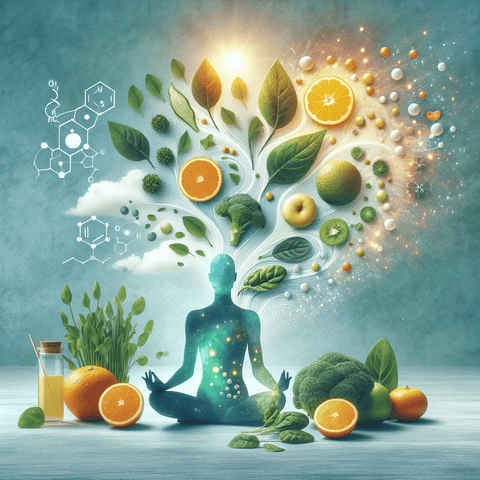Introduction to Vitamin C in Nutritional Supplements
Vitamin C, also known as ascorbic acid, is one of the most widely recognized and consumed dietary supplements in the world. It is best known for its role in supporting immune function; however, its relevance extends far beyond warding off colds. In recent years, researchers have expanded their focus to investigate Vitamin C’s potential in stress modulation and mental health support. Is it possible that Vitamin C could be a natural tool for stress relief — especially relevant in an age where chronic stress affects millions? One reason Vitamin C has garnered so much attention is its classification as an essential nutrient. This means the human body cannot produce it independently and must obtain adequate amounts through diet or supplementation. Found abundantly in citrus fruits, leafy greens, and vegetables such as bell peppers and broccoli, Vitamin C is also commonly available in pill, powder, and chewable supplement forms, making accessibility simple and widespread. Its physiological roles are multifaceted: from acting as a potent antioxidant and enzymatic cofactor to being a critical component in collagen synthesis, wound healing, iron absorption, and more. However, where things get particularly interesting is in its emerging role as part of the body’s stress defense system. Many people turn to Vitamin C as a preventative measure or supplement during stressful periods, believing that it can support their mental clarity and overall resilience. This increasing awareness has spurred both consumer interest and scientific analysis, particularly in relation to how Vitamin C interacts with the body’s stress response mechanisms, impacts hormonal regulation, and contributes to mental health outcomes. The following sections dive into these topics with detailed analysis, exploring the science that supports — or challenges — Vitamin C's place in the stress relief toolkit.Vitamin C and Immune Support: Strengthening Your Body’s Defense Against Stress-Related Illness
A critical connection exists between immune health and stress resilience. Emotional, physical, or environmental stress can weaken immunity, increase susceptibility to infections, and amplify existing illnesses. This is where Vitamin C begins to shine, functioning as a key player in protecting and enhancing immune performance during times of high stress. Vitamin C contributes actively to the function of various immune cells, especially neutrophils, lymphocytes, and phagocytes, which rely on this nutrient for proper functioning. Not only does Vitamin C support white blood cell production and protect them from oxidative damage, but it also enhances the skin’s barrier function — our first physical defense against pathogens. Prolonged stress leads to the overproduction of stress hormones like cortisol and adrenaline, which suppress immune function. This suppression can lead to recurring infections, delayed wound healing, or chronic inflammation. Studies suggest that sufficient Vitamin C intake can potentially attenuate this decline in immune responsiveness. For instance, research has demonstrated that individuals under physical stress — such as endurance athletes or medical students during exams — who received Vitamin C supplementation showed fewer colds and flu incidence compared to those without supplementation. Moreover, there is evidence that Vitamin C shortens the duration of colds, although it may not necessarily prevent them unless the individual is under specific types of physical or psychological stress. Thus, maintaining adequate Vitamin C levels through consistent intake may serve as a proactive measure to bolster immune defenses, contributing to an overall decrease in the adverse health effects associated with stress. When shopping for immune-supportive supplements with high-quality Vitamin C, consider exploring options from the Topvitamine Vitamin C collection, where products are curated to support immunity, antioxidant activity, and energy.Vitamin C and Antioxidant Properties: Protecting Your Cells from Oxidative Stress
Oxidative stress is a condition that arises when there is an imbalance between reactive oxygen species (ROS), also known as free radicals, and the body’s ability to neutralize them through antioxidants. Chronic stress — whether mental, physical, or emotional — can elevate ROS levels, leading to cellular damage, inflammation, and an increased risk for several diseases including heart conditions, neurodegenerative disorders, and even mood dysregulation. Vitamin C is one of the body’s most potent naturally occurring antioxidants. It works by donating electrons to neutralize free radicals, thereby converting them into less reactive molecules. Unlike some antioxidants, Vitamin C is water-soluble, allowing it to act not only in the bloodstream but also in intracellular fluid across a wide variety of tissues and organs. When ROS generators such as psychological stress or environmental toxins increase, Vitamin C's antioxidant capacity becomes vital. Numerous animal and human studies have indicated that Vitamin C may help reduce markers of oxidative stress, thus contributing not only to longevity and chronic disease prevention, but also to protecting neural tissue — a key player in overall mental health. One interesting area is the neuromodulatory role of Vitamin C in the brain. It aids in neurotransmitter synthesis (like dopamine and norepinephrine), which are not only essential for mood stabilization but are especially vulnerable to oxidative damage. By protecting dopamine from oxidative degradation, Vitamin C indirectly promotes a more balanced, grounded stress response. This antioxidant protection may also translate into improved energy levels — often reported by individuals supplementing Vitamin C regularly. Fatigue, both physical and mental, is often linked to oxidative stress. By addressing this issue at the root, Vitamin C supplementation could potentially relieve the exhaustion associated with high-stress lifestyles. From a nutritional supplementation standpoint, adding antioxidant blends incorporating Vitamin C, magnesium, and omega-3s from collections like the Magnesium Collection and the DHA/EPA Omega-3 Collection may provide a synergistic effect in combating oxidative stress and its symptoms.Vitamin C and Cortisol Reduction: Modulating Your Body’s Stress Response
One of the most compelling mechanisms by which Vitamin C may influence stress levels is through its impact on cortisol, the primary stress hormone produced by the adrenal glands. While cortisol is vital for many bodily functions — including metabolism regulation, inflammation control, and blood pressure stabilization — chronic elevation can wreak havoc on the body, leading to fatigue, impaired immunity, insomnia, anxiety, and more. Vitamin C is found in high concentrations in the adrenal glands and plays a key role in the synthesis and regulation of cortisol. During stress, the adrenal glands secrete cortisol into the bloodstream to prepare the body for a fight-or-flight response. This release increases glucose availability to muscles and diverts energy from non-essential functions such as digestion and reproduction. While helpful in the short term, continuous high cortisol levels are detrimental. Some studies on animals and humans suggest that Vitamin C supplementation may help lower cortisol levels after exposure to stressors. One study by researchers at the University of Alabama provided laboratory animals with Vitamin C supplements, finding significantly reduced plasma cortisol levels compared to control groups. Similarly, a human clinical trial published in 2002 found that individuals who took 1,000 mg of Vitamin C daily responded better to psychological stress, with lower blood pressure and cortisol levels. Still, while early evidence is promising, the exact mechanism and consistency of these results require more expansive human clinical trials to validate the cortisol-regulating effects categorically. That said, individuals under high stress may benefit from ensuring that their bodies are not depleted of Vitamin C — particularly if their lifestyle demands are taxing adrenal health. To help manage stress levels naturally, maintaining an adequate level of nutrients involved in adrenal regulation — including Vitamin C and magnesium — may provide tangible benefits. Supplement options from Topvitamine’s Vitamin C collection may be a practical addition to your wellness strategy if adrenal support is a priority.Vitamin C and Stress Relief Supplements: Enhancing Your Stress Management Toolbox
Vitamin C rarely works in isolation when included in stress-focused supplement blends. Many products designed for stress relief combine Vitamin C with other adaptogens, minerals like magnesium, B-complex vitamins, and omega-3 fatty acids that collectively modulate mood, energy, and stress resilience. The inclusion of Vitamin C in such formulations isn’t accidental. It’s often viewed as a catalyst that works synergistically with several nutrients that support neurological and endocrine pathways influenced by stress. Its fast-acting absorption and bioavailability make it one of the first responders when the body begins experiencing fatigue or emotional strain. Forms of Vitamin C also matter. Whether you prefer liposomal Vitamin C for enhanced absorption, effervescent powders for ease and hydration, or classic chewable or capsules for no-fuss intake, the market offers something for everyone. Each option has specific benefits — powders, for instance, are easier to measure and combine into smoothies or juices, making them particularly attractive for wellness-oriented individuals. Natural food sources of Vitamin C such as strawberries, kiwis, oranges, and capsicums are invaluable, but these may not always provide the consistently high doses used in clinical trials. That’s why people often turn to supplementation, especially during periods of high stress or weakened immunity, to ensure the body has ample reserves. For those building a daily stress-busting routine, integrating Vitamin C with lifestyle habits — regular exercise, mindfulness practices, adequate hydration, and sufficient sleep — maximizes the benefits. Begin with small steps: a morning Vitamin C drink alongside meditation or an end-of-day capsule accompanying a magnesium-rich dinner can stack synergistic benefits over time. When comparing supplemental options, the Vitamin C product range on Topvitamine offers everything from standalone forms to specialized blends crafted to support antioxidant balance, stress equilibrium, and immune resilience.Vitamin C and Immune Health: Maintaining Wellness During Stressful Times
During periods of psychological or physical stress, the human immune system undergoes measurable changes. Stress hormones like cortisol not only suppress immune cell activity but can also reduce cytokine production, making the body more prone to infections and slower recovery. This is especially problematic for individuals with high-paced lifestyles, caregivers, or those managing chronic illnesses. Vitamin C’s influence on immune health during stressful times is multi-pronged. As mentioned earlier, it enhances several components of both the innate and adaptive immune responses — including barrier strength, phagocyte function, and reactive species neutralization. But equally important is its replenishment role: stress rapidly depletes Vitamin C levels in plasma and tissues, particularly in the adrenal glands, making daily supplementation crucial. Clinical trials have established that Vitamin C supplementation can both enhance immune function and shorten symptoms’ duration. However, its benefits seem most pronounced in populations under chronic or physical stress, such as military personnel, marathon runners, and those exposed to cold environments. This makes a strong case for regular Vitamin C inclusion in the daily routine, especially when stressors are unavoidable. The best impact usually comes from consistent, moderate dosing rather than mega-doses taken sporadically. Products offered through the Topvitamine Vitamin C product lineup meet this need, offering options that suit various bioavailability and lifestyle preferences. Whether used to supplement an immune-weakening life stage or simply as a hedge against routine stressors, Vitamin C holds meaningful potential for preserving health during turbulent times — not just as a shield but also as a recovery aid.Scientific Evidence and Clinical Studies: What the Research Tells Us
A rigorous review of the available scientific literature reveals a nuanced picture of Vitamin C’s role in stress reduction. While supportive evidence exists, especially with regard to immune enhancement and cortisol regulation, researchers urge caution against overgeneralizing these findings. A 2002 study published in "Psychopharmacology" showed that individuals supplemented with 1,000 mg of Vitamin C not only had lower cortisol levels but also reported reduced levels of psychological stress following stressful tasks. Similarly, a 2015 study in "Nutrients" indicated immune-boosting effects of Vitamin C supplementation during periods of acute physical stress. However, the landscape is not without limitations. Small sample sizes, short durations, subjective measures of stress, and diverse populations all cloud uniform conclusions. More double-blind, placebo-controlled trials involving diverse cohorts are needed to definitively establish causality. Nevertheless, the biological plausibility remains strong. Vitamin C’s involvement in neurotransmitter synthesis, adrenal hormone production, antioxidant defense, and cellular metabolism make it a crucial nutrient during times of both psychological and physiological challenge. For readers looking to understand Vitamin C’s potential through a scientific lens, it's clear that current research supports its role in supporting healthy stress physiology, particularly when used alongside other supportive interventions.Practical Recommendations: How to Use Vitamin C for Stress Management
If you're considering adding Vitamin C to your stress management arsenal, there are several guidelines you’ll want to take into account. The Recommended Dietary Allowance (RDA) for adults ranges between 65-90 mg/day, with an upper limit set at 2,000 mg/day for safety. During times of chronic stress or illness, higher levels between 500 mg and 1,000 mg may offer additional benefits, though always under supervision if doses exceed 1,000 mg regularly. Food remains a reliable source of Vitamin C: citrus fruits, spinach, broccoli, and berries can all help meet daily needs. However, supplementation may ensure consistency and higher plasma concentrations needed to experience potential stress-reducing effects. You can explore high-quality Vitamin C supplements — including buffered forms, liposomal Vitamin C, and formulas designed for timed release — via the Topvitamine Vitamin C product collection. For best results, pair Vitamin C with other stress-reduction strategies: - Daily mindfulness or meditation - Moderate physical activity - Adequate hydration and sleep - Magnesium and omega-3 supplementation - Avoidance of excessive caffeine or alcohol Using these strategies in tandem with consistent supplementation can enhance overall wellness and act as a supportive lifeline during life’s most challenging periods.Conclusion: Is Vitamin C a Viable Ally Against Stress?
Vitamin C is more than just an immune booster or a citrus-borne supplement. As mounting research explores the nutrition-stress connection, Vitamin C stands out as a multidimensional contributor to stress resilience, mental clarity, and physical well-being. From modulating cortisol, protecting against oxidative damage, enhancing immune response during stress, and partnering synergistically with other nutrients, the case for its inclusion in a modern wellness regimen grows stronger. Though not a cure-all, Vitamin C is a scientifically supported, accessible, and cost-effective option that forms a robust part of a holistic stress management strategy. Balanced with lifestyle choices, and possibly complemented by other supplements, it can reinforce your body’s natural coping mechanisms and keep you functioning at your best — both mentally and physically.Q&A Section
Q: Can Vitamin C directly lower stress levels?A: Vitamin C may help reduce physiological stress markers like cortisol, and support neurotransmitter balance, but it should be seen as part of a broader stress management regimen. Q: What dosage of Vitamin C is recommended for stress?
A: While the RDA is 65–90 mg per day, stress-related benefits are often studied at doses between 500–1,000 mg/day. Always consult a healthcare provider when exceeding 1,000 mg/day regularly. Q: Is there a difference between Vitamin C pills and powders for stress relief?
A: Both are effective, but powders may offer faster absorption and easier integration into beverages or foods, which some people find more convenient. Q: How quickly does Vitamin C work for stress?
A: It may take several days or weeks of consistent intake to notice effects on mood and energy, especially when used in combination with other stress-care strategies. Q: Can I get enough Vitamin C from food alone to manage stress?
A: It's possible but challenging, particularly during high-stress periods when the body’s demand for Vitamin C increases. Supplementation may help fill the gap.



